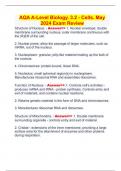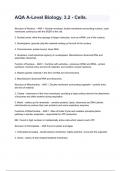Aqa a level biology cells - Study guides, Class notes & Summaries
Looking for the best study guides, study notes and summaries about Aqa a level biology cells? On this page you'll find 467 study documents about Aqa a level biology cells.
Page 4 out of 467 results
Sort by
![AQA A Level Biology 2023 AQA AS BIOLOGY7135/2 Paper 2 Question Paper & Mark scheme (Merged) June 2023 [VERIFIED] AS ECONOMICS what are killer t-cells? - >>ANSWER>>- cytotoxic cells - bind to non-self antigens](/docpics/5557529/66618b769a50e_5557529_121_171.jpeg)
-
AQA A Level Biology 2023 AQA AS BIOLOGY7135/2 Paper 2 Question Paper & Mark scheme (Merged) June 2023 [VERIFIED] AS ECONOMICS what are killer t-cells? - >>ANSWER>>- cytotoxic cells - bind to non-self antigens
- Exam (elaborations) • 245 pages • 2024
-
Available in package deal
-
- $25.39
- + learn more
AQA A Level Biology 2023 AQA AS BIOLOGY7135/2 Paper 2 Question Paper & Mark scheme (Merged) June 2023 [VERIFIED] AS ECONOMICS what are killer t-cells? - >>ANSWER>>- cytotoxic cells - bind to non-self antigens
AQA A-Level Biology. 3.2 - Cells. May 2024 Exam Review
AQA A-Level Biology. 3.2 - Cells Exam 2024 Questions With Verified Answers.
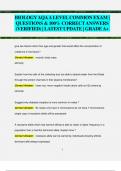
-
BIOLOGY AQA A LEVEL COMMON EXAM | QUESTIONS & 100% CORRECT ANSWERS (VERIFIED) | LATEST UPDATE | GRADEA+
- Exam (elaborations) • 34 pages • 2024
- Available in package deal
-
- $12.49
- + learn more
BIOLOGY AQA A LEVEL COMMON EXAM | QUESTIONS & 100% CORRECT ANSWERS (VERIFIED) | LATEST UPDATE | GRADEA+ give two factors other than age and gender that would affect the concentration of creatinine in the blood ? Correct Answer: muscle/ body mass ethnicity Explain how the cells of the collecting duct are able to absorb water from the filtrate through the protein channels in their plasma membranes? Correct Answer: lower w.p/ more negative inside tubule cells so h2o enters by osmosi...
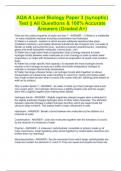
-
AQA A Level Biology Paper 3 (synoptic) Test || All Questions & 100% Accurate Answers (Graded A+)
- Exam (elaborations) • 80 pages • 2024
-
Available in package deal
-
- $20.00
- + learn more
AQA A Level Biology Paper 3 (synoptic) Test || All Questions & 100% Accurate Answers (Graded A+) AQA A Level Biology Paper 3 (synoptic) Test || All Questions & 100% Accurate Answers (Graded A+) What are the useful properties of water and why ? - ANSWER - 1) Water is a metabolite - in many metabolic reactions including condensation and hydrolysis 2) Water is a solvent - medium in which enzyme catalysed reactions take place (metabolic reactions ) and readily dissolves substances like inorgan...
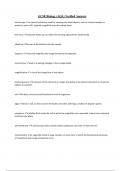
-
GCSE Biology (AQA) Verified Answers
- Exam (elaborations) • 44 pages • 2024
-
Available in package deal
-
- $9.99
- + learn more
GCSE Biology (AQA) Verified Answers microscope an optical instrument used for viewing very small objects, such as mineral samples or animal or plant cells, typically magnified several hundred times. fine focus Knob that allows you to make fine focusing adjustments. (small knob) objective the lens at the bottom near the sample eyepiece A lens that magnifies the image formed by the objective. course focus used to make big changes in focus (large knob) magnification = size of the imag...
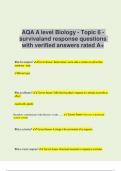
-
AQA A level Biology - Topic 6 - survival and response questions with verified answers rated A+
- Exam (elaborations) • 51 pages • 2024
-
- $22.49
- + learn more
AQA A level Biology - Topic 6 - survival and response questions with verified answers rated A+ What Are receptors? Correct Answer-Detect stimuli- can be cells or proteins on cell surface membrane , loads of different types What are effectors? Correct Answer-Cells that bring about a response to a stimulus to provide an effect ( muscle cells, glands) Receptors communicate with effectors via the Correct Answer-Nervous or hormonal system or both What is a stimulus? C...
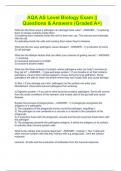
-
AQA AS Level Biology Exam || Questions & Answers (Graded A+)
- Exam (elaborations) • 7 pages • 2024
-
Available in package deal
-
- $8.00
- + learn more
AQA AS Level Biology Exam || Questions & Answers (Graded A+) AQA AS Level Biology Exam || Questions & Answers (Graded A+) What are the three ways a pathogen can damage hosts cells? - ANSWER - 1) rupturing them to release nutrients inside them 2) breaking down nutrients inside the cell for their own use. This starves and eventually kills the cell. 3) replicating inside the cells and bursting them when they're released What are the two ways pathogens cause disease? - ANSWER - 1) producti...
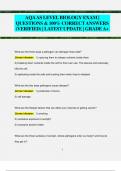
-
AQA AS LEVEL BIOLOGY EXAM | QUESTIONS & 100% CORRECT ANSWERS (VERIFIED) | LATEST UPDATE | GRADEA+
- Exam (elaborations) • 15 pages • 2024
- Available in package deal
-
- $10.49
- + learn more
AQA AS LEVEL BIOLOGY EXAM | QUESTIONS & 100% CORRECT ANSWERS (VERIFIED) | LATEST UPDATE | GRADEA+ What are the three ways a pathogen can damage hosts cells? Correct Answer: 1) rupturing them to release nutrients inside them 2) breaking down nutrients inside the cell for their own use. This starves and eventually kills the cell. 3) replicating inside the cells and bursting them when they're released What are the two ways pathogens cause disease? Correct Answer: 1) production of toxi...
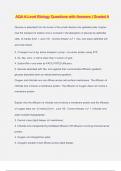
-
AQA A-Level Biology Questions with Answers | Graded A
- Exam (elaborations) • 21 pages • 2024
-
- $12.49
- + learn more
AQA A-Level Biology Questions with Answers | Graded A Glucose is absorbed from the lumen of the small intestine into epithelial cells. Explain how the transport of sodium ions is involved in the absorption of glucose by epithelial cells. (5 marks) [Unit 1, June 16] - Correct Answer ️️ -1. Na+ ions leave epithelial cell and enter blood; 2. (Transport out is by) active transport / pump / via carrier protein using ATP; 3. So, Na+ conc. in cell is lower than in lumen (of gut); 4. Sodium/N...

That summary you just bought made someone very happy. Also get paid weekly? Sell your study resources on Stuvia! Discover all about earning on Stuvia

